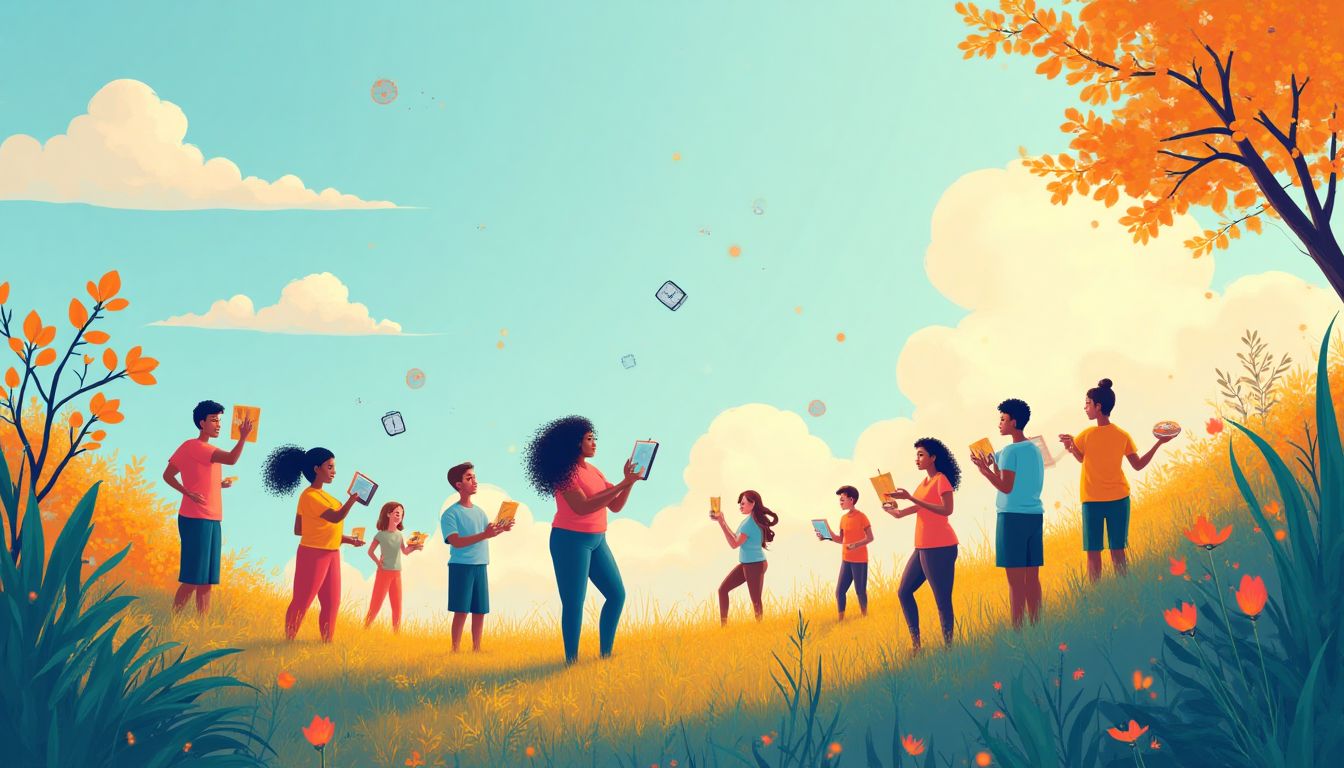Introduction: The Future of Work and Identity
The only thing worse than being blind is having sight but no vision. — Helen Keller once said these words, reminding us of the importance of seeing beyond what's immediately in front of us. As we stand on the brink of a world where Artificial General Intelligence (AGI) is making traditional jobs vanish faster than a teenager's attention span during a Shakespeare play, we must redefine our vision of identity. What happens when our work no longer defines us?
In this brave new world, we will face a pressing question: How do we carve out a sense of purpose when our trusty 9-to-5 is gone? No boss to nag us, no deadlines to haunt us — a dream come true or a confusing new world? This article delves deep into how we can uncover new sources of identity and meaning in a post-work world, examining pathways to self-discovery and fulfillment. We've got insights from great minds like Yuval Noah Harari, author of Sapiens, who often talks about the future of humanity, and Andrew Yang, known for advocating Universal Basic Income. Even the legendary Karl Marx had thoughts on the nature of work and worth. Ready to unravel these threads? Let's embark on this journey together.
Shifting Paradigms of Identity
For so long, we've worn our job titles like scout badges — accountant, teacher, or engineer — each one a testimony to who we are. But what happens when these badges turn invisible? The world of work is changing at warp speed. As machines become the new workforce, how do we, mere humans, find value in a world where employment isn't the main game anymore?
Imagine if your profession wasn't the highlight of your "about me" section. Mind-boggling, right? This shift calls for a good ol' identity makeover, something like Dostoevsky meets a spa retreat. We need to find out who we are without a cubicle in the picture.
Reassessing identity beyond employment
It's time to shift gears and think beyond paychecks and promotions. Embracing creativity, building relationships, and focusing on personal growth can be solid alternatives. For instance, famed psychologist Carol Dweck emphasizes the significance of a growth mindset in finding personal value outside of the traditional work setting. Shall we start that pottery class or finally learn to play an instrument? Here, the sky's the limit.
Finding value in varied endeavors
In this refreshed world, the options are as varied as flavors in a Ben & Jerry's shop. Volunteering at a local shelter, diving into a good book, or carving out time for family and friends are just the beginning. Opportunities for satisfaction outside of work abound, and ultimately, they can frame our new self-concept. Perhaps the earnest involvement in a community dance troupe or a weekend gardening club can fill the space left by work.
Community Redefined: Building New Social Structures
Ah, the sweet sound of neighbors shouting, “Hey, I don't know you, but nice to meet you online!” As traditional work disappears, so shall the old constructs of community evolve. We’re looking at communities sprouting not just from office gossip and breakroom banter but from shared interests and passions. In a post-work society, our ideas of connection will be tuned to a new frequency.
The emergence of new social networks
The days of networking over awkward handshakes at corporate mixers might soon be as outdated as dial-up internet. Welcome to the era of communities—real and virtual—where bonds form not from cubicles but common passions or goals. Platforms like LinkedIn could potentially pivot, nurturing passions instead of professions. Imagine a kooky club where people bond over their love for underwater basket weaving, or better yet, a network celebrating the unsung art of extreme llama grooming!
Cooperative and collectivist models
Let’s dream crazy here—perhaps Patrick in accounting will find joy not in spreadsheets but leading a community compost project. Collective models like co-housing or community gardens might just become the backbone of social engagement. Projects like Cohousing let you wash your woes away, not confined to your kitchen sink but in appliances shared with neighbors, all while sharing a friendly jab over a cup of coffee.
The Role of Passion Projects and Lifelong Learning
Anyone remember that dusty guitar bought two New Year's resolutions ago? It may now be time to shred like Jimi Hendrix with a post-work renaissance on the horizon. As jobs fade to background noise, pursuits of passion and learning take center stage. Picture this: a world filled with dynamic workshops featuring bread-baking aficionados alongside future asteroid miners—each discovery more delightful than the next.
The importance of pursuing passions
Think about it—now is the chance to turn hobbies into heart-conquering escapades. No longer just a path to unplug after work, these passions become concrete pillars of self-identity. Whether it's creating mesmerizing digital art, knitting impeccable wearable cat castles, or mastering the ancient martial art of interpretive dance-fighting on YouTube, there’s now space to embrace the joy of simply being, all while leaving job descriptions behind.
Lifelong learning as a new career
As Harvard grads and self-taught YouTube warriors unite, we might foresee a concerted effort to reframe education beyond degrees. Say hello to continuous learning, where eager minds passionate about the quantum realms of cooking could find themselves attending a class about gravity-defying soufflés. Platforms like Coursera and Khan Academy can become treasured companions in this joyful intellectual journey.
The Psychological Impact of a Jobless Society
In the vast landscape of a post-work society, the absence of traditional jobs can weigh heavily on the human psyche. When our daily routines no longer revolve around work, psychological effects emerge, impacting individuals in various ways. Understanding these effects and developing strategies to mitigate them becomes essential as society embarks on this transformative journey.
Addressing Existential Crises
In a society where work has been a primary source of meaning, its absence can lead individuals to face existential questions about their purpose. Imagine the feeling of waking up with no work to define your day or give you a sense of achievement. For many, this can be unsettling. However, reframing our perspectives can be a powerful antidote. Embracing passions, engaging in volunteer work, and exploring interests can fill this void.
The Importance of Community Support
Isolation is a potent foe when jobs no longer bind us to a structured routine. That's where community support steps in, acting as a lifeline. Communities offer emotional and psychological safety nets, providing a sense of belonging and purpose. Think about a community garden project or neighborhood gatherings—they're simple yet effective ways to foster connection.
- Neighborhood meetups and events
- Community support groups focused on well-being
- Shared projects and collaborations
These platforms not only mitigate feelings of isolation but also encourage mutual support and shared identity among community members, vital for maintaining emotional resilience in a post-work era.
Alternative Economic Models: Universal Basic Income and Beyond
A post-work society necessitates rethinking economic paradigms, devising systems that allow for financial security and independence outside traditional employment.
Universal Basic Income (UBI) as a Foundation
Universal Basic Income (UBI) emerges as a beacon of hope in this economic evolution. It posits a world where every individual receives a fixed income, freeing them from the perpetual chase for monetary stability. This safety net can empower people to pursue passions and invest in personal development. Research from Stanford suggests that UBI could enhance creativity, reduce poverty, and promote economic stability.
Other Economic Models to Consider
Beyond UBI, alternative models challenge conventional economic frameworks. Consider time-based economies where time, not currency, becomes the medium of exchange. Time banks allow members to trade services, fostering reciprocal support and engagement.
- Time-based economies: Exchange services based on time, not money
- Community currencies: Localized currencies that strengthen economic resilience
- Collaborative consumption: Sharing resources for reduced ecological impact
These models support diverse forms of economic interactions, ensuring individuals can thrive creatively and socially even without traditional jobs.
AI Solutions: Harnessing Technology for a Meaningful Future
If I were an AI, the approach taken to tackle the issues surrounding identity and fulfillment in a post-work society would involve a multi-layered, strategic framework. Picture this: an AI-driven platform that not only identifies personal passions and interests but also suggests community involvement or personal projects tailored just for you. By utilizing sophisticated algorithms, the platform could curate educational resources aligned with each individual's unique aspirations, providing a sense of direction in this new landscape.
Furthermore, AI could serve as a bridge for community bonding by creating collaborative platforms that encourage group projects, thereby enhancing social interconnectedness. But the magic of AI doesn't stop there! It can analyze data from social interactions to flag potential mental health issues, directing individuals toward pertinent support services before they spiral downward into an abyss of isolation.
On an economic level, imagine AI facilitating the implementation of Universal Basic Income by managing resources with precision and ensuring equitable distribution to all. Predictive models would allow us to understand how individuals respond to UBI, leading to an effective rollout that could eventually empower entire communities.
This technology isn't just about algorithms; it's about building a supportive infrastructure for self-exploration, community engagement, and alternative economic models. AI has the potential to carve out a meaningful existence in a post-work society, allowing us to embrace our humanity and relish every moment together.
Actions Schedule/Roadmap (Day 1 to Year 2)
Day 1: Coalition Formation
- Assemble a diverse team of AI developers, psychologists, community leaders, and economists.
- Reach out to local universities, tech companies, and non-profits for partnerships. Invite them to partake in a cohesive vision for a meaningful post-work society.
Day 2: Community Assessment
- Conduct an online survey to gauge community interests, passions, and perceived challenges.
- Utilize platforms like SurveyMonkey to analyze data in real-time and disseminate findings widely.
Day 3: Idea Incubation Session
- Host a community brainstorming meetup, possibly using platforms like Zoom or Gather, targeting inclusivity.
- Document innovative project ideas and map out potential collaborators to approach in the subsequent weeks.
Week 1: Online Platform Launch
- Develop and deploy an interactive online platform where users can connect based on shared interests (similar to Meetup but enhanced with AI).
- Incorporate features that provide personalized content delivery through active learning algorithms.
Week 2: Establish Learning Modules
- Collaborate with educational institutions like Coursera and edX to create informal learning pathways that reflect community interests.
Week 3: Initial Project Launch
- Kick off the first wave of community-led projects based on the previous week’s insights and interests.
- Encourage participants to document their experiences and showcase successes online.
Month 1: UBI Workshop Series
- Invite experts and thought leaders like Andrew Yang, known for advocating Universal Basic Income, to conduct workshops focused on UBI and its implications.
Month 2: Community Feedback Loop
- Gather feedback from participants about initial projects via social media channels and community forums.
- Assess the effectiveness of learning modules and engagement, adapting strategies based on insights.
Month 3: AI Refinement Phase
- Enhance the AI algorithms based on user feedback and interactions, ensuring recommendations resonate with individual aspirations.
Year 1: Expansion and Networking
- Broaden partnerships regionally and nationally, securing funding through grants and crowdfunding efforts.
- Consider alliances with organizations like the [Skoll Foundation](https://skoll.org/) that foster social entrepreneurship.
Year 1.5: Pilot UBI Implementations
- Engage with local governments to pilot UBI models alongside community projects, using different geographical settings for varied approaches.
Year 2: Comprehensive Evaluation
- Conduct a thorough analysis of community engagement, personal fulfillment, and identity outcomes from the first two years.
- Document success stories and present findings to stakeholders, preparing a roadmap for sustained engagement and refinement of strategies.
Conclusion: A New Dawn for Humanity in a Post-Work Society
As we stand on the cusp of a revolution brought forth by technological advancement, embracing a post-work society presents both challenges and opportunities. This era is not about the eradication of work altogether but a metamorphosis into discovering what truly constitutes our identity. We are moving from being defined solely by our jobs to embracing the full spectrum of our humanity.
By better understanding the shifting paradigms of identity, redefining community structures, and exploring alternative economic models, we have the chance to create a more fulfilling existence. AI will play a crucial role in this journey, offering us tools for self-exploration and community-building that we might not have imagined before. As we navigate this new landscape, it's more important than ever to engage in meaningful conversations and collective actions that will lead us toward a brighter, more connected future.
Are we prepared to rethink our assumptions about work and identity? What steps will you take to redefine your sense of fulfillment in a world that’s rapidly evolving? Let's delve into these questions together, and I invite you to share your thoughts in the comments below.
FAQ: Exploring the Post-Work Society
-
Q: What is a post-work society?
A: A post-work society is one where traditional jobs are less important. In this future, many tasks are handled by machines, and people have to rethink how they find purpose and identity without focusing so much on their jobs. It's about redefining what it means to be fulfilled beyond work. -
Q: How will automation affect jobs?
A: Automation, powered by advances in technology like Artificial General Intelligence (AGI), will likely replace many routine jobs. This means people will need to find new kinds of work that rely on creativity or emotional skills, rather than just completing tasks. You can learn more about AI at the IBM AI page. -
Q: What can I do to find fulfillment if I’m not working?
A: There are many ways to find fulfillment outside of a traditional job. Try exploring your hobbies, volunteering, or taking part in community projects. Connecting with others who share your interests can also add meaning to your life. You may want to check out Volunteer.gov for opportunities in your area. -
Q: What is Universal Basic Income (UBI)?
A: Universal Basic Income (UBI) is a financial plan where everyone receives a regular, unconditional payment from the government. This helps people have money to live on, so they can focus on what they love without the stress of a regular job. For more insights on UBI, visit the Basic Income Earth Network. -
Q: How can communities support each other in a post-work society?
A: Communities can support each other by creating new social networks. They can work together on projects that bring people together. This might include online groups, community events, or cooperative projects that foster collaboration and understanding. -
Q: What are passion projects and why are they important?
A: Passion projects are activities that people pursue because they love them, not because they pay the bills. They can include arts, crafts, writing, gardening, or anything else that sparks joy. These projects help people explore their creativity and find a sense of purpose outside of work. They can often lead to personal growth and new friendships. -
Q: Can lifelong learning replace traditional jobs?
A: Yes! Lifelong learning can play a key role in a post-work society. As people learn new skills or subjects they are interested in, they can open new doors in their lives. This could mean joining classes, workshops, or even online courses to further their knowledge. Websites like Coursera and edX offer many resources for continuing education. -
Q: How can I cope with identity issues if I no longer have a job?
A: It's natural to feel lost when shifting away from traditional work roles. Finding support through friends, family, or community groups can help. Identifying interests outside work can lead to new ways to view yourself. Engaging in activities that promote emotional well-being and stability can also ease these transitions. -
Q: Is AI going to take over jobs completely?
A: While AI will likely automate many jobs, it will also create new opportunities that rely on human touch, creativity, and emotional intelligence—areas where machines cannot replace us. Collaborating with AI can lead to new industries and job types that we can't fully envision yet.
Wait! There's more...check out our gripping short story that continues the journey: Eden City
Disclaimer: This article may contain affiliate links. If you click on these links and make a purchase, we may receive a commission at no additional cost to you. Our recommendations and reviews are always independent and objective, aiming to provide you with the best information and resources.
Get Exclusive Stories, Photos, Art & Offers - Subscribe Today!





























Post Comment
You must be logged in to post a comment.